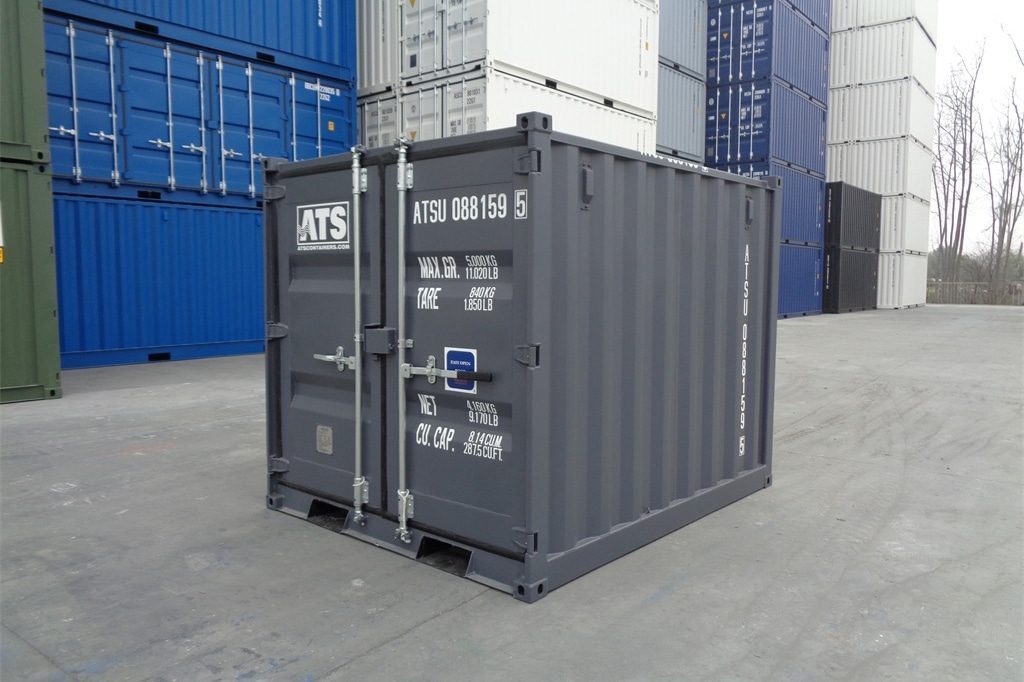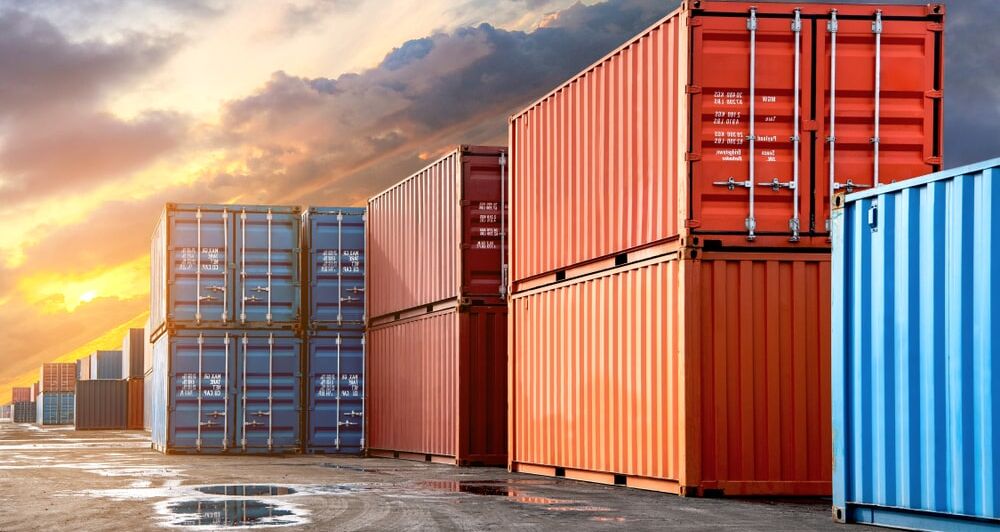Whatever You Required to Find Out About Shipping Containers and Their Practical Applications
Shipping containers have actually evolved from simple tools for transport to versatile structures with numerous useful applications. Their durable layout and standard sizing make them suitable for a variety of usages beyond delivery. From cutting-edge housing services to lasting farming, their flexibility is significant. The possibilities do not end there. Discovering their various features discloses surprising understandings right into imaginative options and contemporary difficulties. What various other functions could these containers play in today's world?
The Design and Framework of Shipping Containers

Inside, containers are made to make best use of area, often featuring wooden or steel flooring that can sustain considerable weight. Air flow systems may be incorporated to avoid dampness accumulation, which is essential for delicate freight. Furthermore, enhanced edges enable easy handling by forklifts and cranes, facilitating smooth loading and discharging. This thoughtful layout and structure contribute to the containers' convenience throughout numerous shipping and storage applications.
Benefits of Using Shipping Containers
While numerous transportation techniques have their advantages, making use of shipping containers sticks out as a result of their unparalleled versatility and effectiveness. Shipping containers offer a standardized size, making them simple to deliver and stack across various settings of transportation, including trucks, trains, and ships. This standardization decreases loading and discharging times, thus enhancing general performance.
Shipping containers are constructed from long lasting products, supplying robust defense for goods during transportation. They are safe and secure and weather-resistant, reducing the threat of damage from environmental factors or burglary. In addition, the modular style of shipping containers enables for simple customization, allowing services to adapt them for different functions, such as storage space or mobile workplaces.
Finally, their mobility and cost-effectiveness make delivery containers an attractive alternative for organizations seeking to simplify logistics and supply chain procedures. These benefits add to the growing appeal of delivery containers in numerous sectors.
Innovative Housing Solutions With Shipping Containers
Cutting-edge housing services have actually become an exciting application of shipping containers, leveraging their intrinsic staminas for residential usage. These functional frameworks offer a lasting option to traditional building materials, often at a fraction of the price. Developers and engineers have actually transformed containers into elegant, functional homes, catering to varied way of livings and choices.

Furthermore, delivering containers are environmentally friendly, promoting recycling and minimizing waste. Several tasks concentrate on energy effectiveness, integrating solar panels and green roofs. As urbanization increases, these ingenious real estate remedies provide a practical feedback to housing lacks while cultivating a special architectural aesthetic.
Shipping Containers in Retail and Pop-Up Shops
An expanding number of stores are turning to delivering containers as a vibrant remedy for pop-up stores and retail spaces. These versatile frameworks offer an economical alternative to conventional shops, permitting organizations to create distinct, captivating environments that draw in clients. Their modular style makes it possible for very easy transportation and installment, making them excellent for seasonal or short-lived retail locations.
Sellers can customize delivery containers to reflect their brand name identification, transforming them into aesthetically appealing shops that stick out in crowded marketplaces. The compact nature of containers also urges effective use of space, enabling innovative designs that maximize consumer flow and interaction. Furthermore, shipping containers can be situated in unconventional areas, such as urban parks or vacant lots, enhancing ease of access and foot website traffic.
As the retail landscape evolves, shipping containers give a ingenious and flexible solution that fulfills the demands of modern customers while enhancing the purchasing experience.
Lasting Farming Practices Using Shipping Containers
Lasting farming methods increasingly include delivery containers as innovative remedies for agriculture - shipping containers for sale near me. These container farms make use of hydroponics to make the most of room and resource effectiveness, supplying an economical technique to food production. By changing shipping containers right into agricultural centers, farmers can deal with food safety and ecological worries at the same time
Container Farming Advantages
While typical agriculture encounters challenges such as land shortage and environment adjustment, container farming offers a sensible option that takes full advantage of room and resources. This cutting-edge technique enables year-round plant manufacturing in controlled environments, reducing dependence on weather conditions. Container farms utilize less water than traditional farming, promoting sustainability and conservation. They can be developed in city locations, bringing fresh produce closer to customers and lowering transportation exhausts. Additionally, the modular nature of delivery containers makes it possible for scalability, enabling farmers to change procedures based upon need. Container farming also lessens pesticide usage by developing a confined ecological community, ultimately improving food security. As city populaces grow, container farming arises as a sensible service to meet the boosting demand for regional, lasting food resources.
Hydroponics in Containers
Hydroponics, which enables plants to expand without dirt by making use of nutrient-rich water, grows within the confines of delivery containers, making it an ideal approach for metropolitan farming. These containers produce a controlled atmosphere that enhances temperature level, moisture, and light, allowing year-round farming. With limited space in urban areas, shipping containers use a scalable service for expanding fresh produce. Hydroponic systems within containers can include numerous techniques, such as nutrient film technique (NFT) and deep water society (DWC), which take full advantage of return while minimizing water use. This cutting-edge technique not only boosts food protection but additionally minimizes the carbon impact associated with typical farming approaches. Subsequently, hydroponics in containers stands for a forward-thinking service for sustainable urban food production.
Cost-Effective Farming Solutions
As food manufacturing encounters boosting website obstacles as a result of climate modification and urbanization, shipping containers become a cost-effective service for agriculture. These functional frameworks can be repurposed for various sustainable farming methods, such as hydroponics and upright farming. By making use of regulated settings within containers, farmers can optimize growth cycles and minimize source usage, including water and plant foods. Additionally, delivering containers can be purposefully put in city areas, decreasing transport prices and boosting accessibility to fresh fruit and vegetables. Their modular nature permits scalability, enabling farmers to broaden procedures as demand grows. In addition, repurposing containers adds to lose reduction, straightening with green farming efforts. Overall, shipping containers present innovative possibilities for efficient and lasting food manufacturing.
Emergency and Catastrophe Alleviation Applications of Shipping Containers

Organizations frequently use shipping containers to produce mobile centers or area healthcare facilities, making sure that healthcare reaches those in demand. Additionally, they can be changed into command centers for collaborating rescue operations, consequently improving business effectiveness throughout crises.
Furthermore, containers can be modified to keep necessary products such as water, garments, and food, safeguarding supplies till they are distributed. Their flexibility enables them to be easily delivered to various areas, making sure that help shows up where it is most urgently needed. In general, delivery containers play an essential duty in improving the effectiveness of calamity alleviation initiatives worldwide.
Regularly Asked Questions
Exactly How Are Shipping Containers Transported From One Place to An Additional?
Shipping containers are transferred using ships, trucks, and trains, utilizing cranes for unloading and filling. This multi-modal transportation system ensures effective motion throughout land and sea, attaching worldwide supply chains and assisting in international profession.
What Is the Average Life-span of a Delivery Container?
The typical life expectancy of a shipping container usually ranges from 10 to 25 years, depending on maintenance, use, and ecological aspects. Proper care can prolong their functionality, while disregard might bring about deterioration and damage.
Can Shipping Containers Be Customized for Different Usages?
Yes, delivering containers can be customized for different uses. They work as homes, workplaces, pop-up shops, and storage devices. Their versatility enables imaginative adjustments, making them ideal for a broad variety of applications.
Are Shipping Containers Eco-friendly?
Shipping containers can be ecologically pleasant, as they advertise reusing and repurposing. Their toughness minimizes waste, while their usage in alternate real estate and companies minimizes the need for brand-new products, adding to sustainable practices.
Just how Do I Select the Right Dimension Shipping Container?
To choose the best dimension shipping container, one have to analyze storage space demands, think about the desired usage, and examine space accessibility - Shipping Containers for Sale. Usual sizes include 40-foot and 20-foot containers, each offering various storage and transportation needs effectively
Ingenious housing services have actually arised as an interesting application of delivery containers, leveraging their inherent strengths for residential use. The versatility of shipping containers allows for innovative designs, from single-unit homes to complex multi-container plans. Lasting farming practices increasingly integrate shipping containers as ingenious solutions for farming. In addition, the modular nature of shipping containers makes it possible for scalability, permitting farmers to readjust operations based on need. Hydroponics, which permits plants to grow without soil by using nutrient-rich water, grows within the confines of shipping containers, making it a perfect approach for metropolitan agriculture.